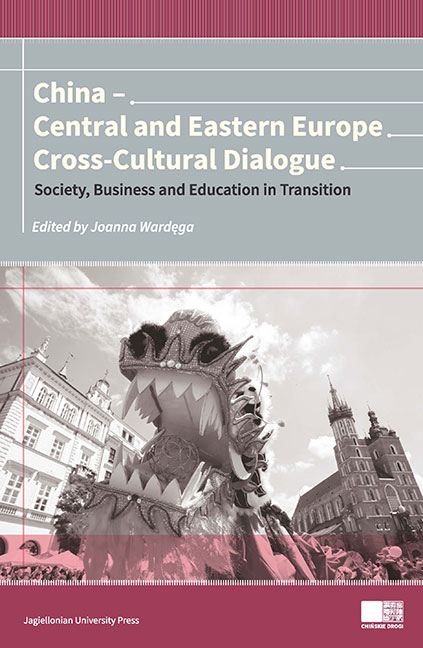Book contents
- Frontmatter
- Contents
- Foreword
- PART I Society and Culture in Transition
- Idealism and Relativism in Ethics: Comparing China and Central Eastern Europe (CEE)
- China's Role in the New World Order
- Redefining and Elderly Caregiving in the 21st Century China and Poland
- Roadmap for Moving to a Low Carbon Economy in China and Poland. Comparative Analysis
- Chinese Community in Poland – the Dynamics of its Development
- Perceptions of China among Central and Eastern European University Students
- Transformation of the Dragon – China's Image in the Polish Media
- Bridges and Obstacles in “the Way of the Ideal Government”: the Transition from Mind Confucianism to Political Confucianism from Jiang Qing's Point of View
- Conceptualizations of Constitutionalism in Recent China's Debates: Preliminary Typologies
- PART TWO Economy and Markets in Transition
- PART THREE Education in Transition
- Contributors
Transformation of the Dragon – China's Image in the Polish Media
from PART I - Society and Culture in Transition
Published online by Cambridge University Press: 22 December 2017
- Frontmatter
- Contents
- Foreword
- PART I Society and Culture in Transition
- Idealism and Relativism in Ethics: Comparing China and Central Eastern Europe (CEE)
- China's Role in the New World Order
- Redefining and Elderly Caregiving in the 21st Century China and Poland
- Roadmap for Moving to a Low Carbon Economy in China and Poland. Comparative Analysis
- Chinese Community in Poland – the Dynamics of its Development
- Perceptions of China among Central and Eastern European University Students
- Transformation of the Dragon – China's Image in the Polish Media
- Bridges and Obstacles in “the Way of the Ideal Government”: the Transition from Mind Confucianism to Political Confucianism from Jiang Qing's Point of View
- Conceptualizations of Constitutionalism in Recent China's Debates: Preliminary Typologies
- PART TWO Economy and Markets in Transition
- PART THREE Education in Transition
- Contributors
Summary
This paper was written as a part of a wider research project, conducted in 20141 and aimed to establish the image of migrants and foreign ethnic groups in the Polish media. One of interesting findings of this research was a surprisingly positive image of China and the Chinese in the Polish media (at least during the period included in the research time frame – the second half of 2013). Such a relatively positive image was contradictory to the stereotypical belief that China is still being depicted in the Polish media mainly as a Communist and totalitarian, undeveloped country. Moreover, the problem of China and Chinese image in media content has not been popular among the scholars engaged in the Polish academic discourse. Actually, during our research we found only three articles referring to this issue: one referring strictly to image of China and the Chinese in the Polish media (Bukowski 2014), and two of them focusing on the image of different ethnic groups in the Polish media (Mrozowski, 1997; Jóźwik, Konieczna-Sałamatin & Tudorowski, 2010) where China was a minor point of interest.
Therefore, since our research interests include China's media image in the world, we decided to pay more attention to the outcome of the broader research and analyze the image of China in the Polish media in a more detailed way.
However, the very notion of a country image had been so widely discussed by numerous scholars from various fields, that we decided to provide a short overview of some of the definitions that had been worked out by them. This notion is rooted, to some extent, in the Lippmann's stereotype, and had been used mostly in three contexts: tourism, marketing and international relations. It is a bit ironic, though, since one of the first “imagologists”, Kenneth Boulding, stated that “the national image is basically a lie, or at least a perspective distortion of the truth” (1959, p. 122), Quite frequently the term „national image” is substituted with „country image”, but the latter should be applied in the tourism and marketing contexts. According to Jenes (2012), the proliferation of image-related academic project dates back to the early 2000's, but first such works were conducted in the USA as early as in 1930's (Katz & Braly, 1933).
- Type
- Chapter
- Information
- China - Central and Eastern Europe Cross-Cultural Dialogue Society, Business and Education in Transition , pp. 121 - 140Publisher: Jagiellonian University PressPrint publication year: 2016



